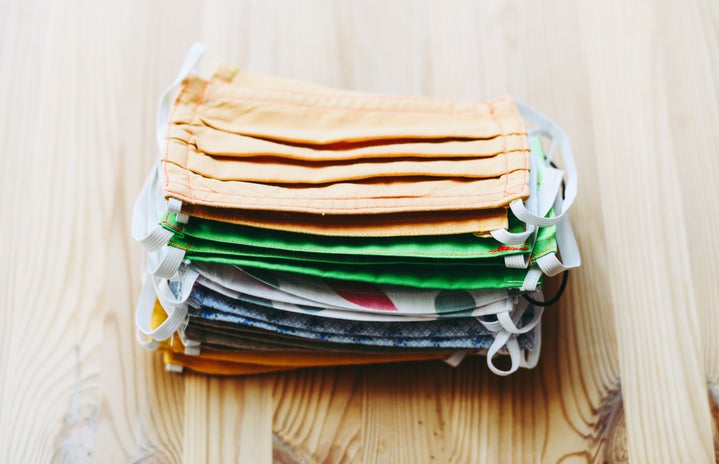You’re already dealing with online classes, social distancing and canceled events. But on top of it all, your face masks are giving you acne. Wearing face masks has become a part of everyday life and is crucial in slowing the spread of COVID-19. There are a variety of masks, from homemade masks to disposable ones to cotton-based masks. However, while face masks are excellent in preventing the spread of COVID-19, they are terrible at keeping our skin clear and healthy. Masks touch our faces, we set our masks down on different surfaces, then we touch our masks and then we put our masks back on our faces. Long story short, more microbes are being spread to our face than ever, in addition to the irritating friction on our face. The result? Acne, or what dermatologists are now calling “maskne.” But never fear, there are ways to treat maskne and prevent it.
What is maskne and what causes it?
Maskne is not just a catchy word, but an actual term used to describe the skin inflammation that results from wearing face masks regularly. U.S. Dermatology Partners defines maskne as acne caused by continued friction against the skin combined with trapped moisture and sweat that aid in the spread of bacteria. Maskne shows up on the nose, jaw, cheeks and areas around the mouth. It can occur anywhere a mask covers and where you may pull your mask down toward. Maskne is also caused by wearing makeup, humidity, stress, cold or dry weather and wearing sunscreen. Anytime you are wearing a face mask, there is potential for maskne. Nevertheless, you can lower the risk of maskne quite easily and treat it.
Treating maskne
Fundamentally, simplifying your skincare is an effective way to lessen skin inflammation and irritation. Try using gentle products with no harsh chemicals (that means no grapefruit or lemon products or anything with alcohol). If you want a more direct treatment for your skin, the Paula’s Choice Skin Perfecting Liquid Exfoliant 2% BHA helps to unclog pores and exfoliate the skin. Use once or twice daily after cleansing. For stronger acne treatment, try using a benzoyl peroxide spot treatment of 2.5% to 5% concentration directly on pimples. I recommend this affordable one from Amazon. U.S. Dermatology Partners also recommends using a petrolatum-based product for protection on areas of the skin that have become inflamed due to mask friction.
How to prevent the spread of maskne
First and foremost, wash your masks! If you can’t remember the last time you washed your mask or switched it out, it’s been too long. With disposable face masks, make sure you’re throwing them away if they become soiled, wet or if you’ve been sweating. This will limit the number of microbes being transferred onto your skin.
The type of mask you’re using can also affect the number of microbes on your mask. Look for masks that are made from 100% cotton or are proven to limit the transfer of bacteria. A company called Atoms makes an Everyday Mask that has a copper-lined ionized quartz yarn inner layer. Or try this Copper Infused Organic Cotton Barrier Face Mask from Natural Home.
In addition to hygienic habits when using face masks, your makeup routine can either prevent or cause maskne. Skipping the foundation during your makeup routine will reduce clogged pores and skin irritation when wearing a face mask. Instead, spend a little more time on another feature. When wearing a mask, all people can see are your eyes, so focus on making them pop! This liquid eyeliner from NYX Cosmetics will give you a stand-out cat eye every day of the week. For a more subtle eye look, CoverGirl makes a great eye pencil linked here that comes in a variety of shades.
For those who include sunscreen in their daily skincare routine (as everyone should), opt for a mineral sunscreen, which will help decrease inflammation in the skin. EltaMD makes a UV Daily Broad-Spectrum sunscreen that is a skincare cult classic and won’t break the bank.
Overall, maskne may be a pain but there is a range of ways to treat this type of acne and prevent it. Changing your masks out frequently and simplifying your skincare routine is just a couple of ways to stop maskne from occurring. Using products with BHA and benzoyl peroxide in them will aid in treating acne and skin inflammation. Remember to take care of your skin while staying safe this semester.


